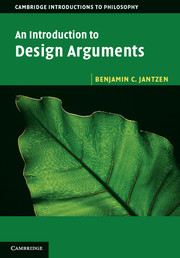Book contents
- Frontmatter
- Dedication
- Contents
- List of figures and tables
- Preface
- 1 Introduction
- 2 Preliminaries
- 3 Arguments from antiquity
- 4 Medieval arguments
- 5 The golden age of natural theology
- 6 Unusual design arguments
- 7 Hume
- 8 Paley
- 9 Darwin
- 10 Loose ends
- 11 The modern likelihood argument
- 12 Intelligent design I: irreducible complexity
- 13 Intelligent design II: specified complexity
- 14 What is complexity?
- 15 Supernatural agents and the role of laws
- 16 A brief survey of physical law
- 17 Fine tuning I: positive arguments
- 18 Fine tuning II: objections
- 19 Conclusion
- Bibliography
- Index
3 - Arguments from antiquity
Published online by Cambridge University Press: 05 June 2014
- Frontmatter
- Dedication
- Contents
- List of figures and tables
- Preface
- 1 Introduction
- 2 Preliminaries
- 3 Arguments from antiquity
- 4 Medieval arguments
- 5 The golden age of natural theology
- 6 Unusual design arguments
- 7 Hume
- 8 Paley
- 9 Darwin
- 10 Loose ends
- 11 The modern likelihood argument
- 12 Intelligent design I: irreducible complexity
- 13 Intelligent design II: specified complexity
- 14 What is complexity?
- 15 Supernatural agents and the role of laws
- 16 A brief survey of physical law
- 17 Fine tuning I: positive arguments
- 18 Fine tuning II: objections
- 19 Conclusion
- Bibliography
- Index
Summary
The emergence of design arguments
We’ll begin our historical survey of design arguments in the first century BCE. This choice is somewhat arbitrary, since by that point in history, what we would recognize as a design argument had been around for centuries. But it was around this time that Cicero wrote his De natura deorum, the oldest surviving manuscript to gather together and assess the full crop of ancient design arguments. This work represents the earliest point at which the handful of arguments we will follow over the next two millennia were indisputably in play, and so it makes a natural starting point for studying design arguments. Nonetheless, it is worth glancing back into the earlier days of design arguments – and of philosophy itself – before we go forward with our survey.
It would take another book altogether to trace the crystallization of recognizable design arguments from the rich brine of early philosophy. To begin with, the emergence of design arguments had to wait for a particular combination of philosophical views to develop. This was not for lack of conviction in the existence of gods or divine intelligence. Rather, the earliest known attempts at systematic, scientific explanation of the world (as opposed to mythic or religious ones) simply assumed that intelligence like ours is the dominant mechanism in the physical world – everything was considered animate to one degree or another. Particularly for the scientifically minded Milesians, early attempts at a workable physics focused on the search for ‘principles’, the primary causes of all structure and change. For instance, Thales of Miletus declared that the principle is water. By this he seems to have meant that water is the original substance of the world, and all subsequent physical features of the world can be accounted for on the basis of the properties of water and its changing states. If we are to believe Aristotle, Thales also said that “all things are full of a gods.” That seems an odd thing to say after offering a sort of physical theory of the world, but it is characteristic of early accounts. It is a bit of a caricature, but such accounts understood living intelligence to be a pervasive force which could be used to explain the structure of the world and our experience of it.
- Type
- Chapter
- Information
- An Introduction to Design Arguments , pp. 29 - 46Publisher: Cambridge University PressPrint publication year: 2014



